Disclaimer
The information contained in this document is believed to be accurate in all respects but is not warranted by Algo. The information is subject to change without notice and should not be construed in any way as a commitment by Algo or any of its affiliates or subsidiaries. Algo and its affiliates and subsidiaries assume no responsibility for any errors or omissions in this document. Revisions of this document or new editions of it may be issued to incorporate such changes. Algo assumes no liability for damages or claims resulting from any use of this manual or such products, software, firmware, and/or hardware.
No part of this document can be reproduced or transmitted in any form or by any means – electronic or mechanical – for any purpose without written permission from Algo.
For additional information or technical assistance in North America, please contact Algo’s support team:
1-604-454-3792
support@algosolutions.com
Introduction
Intermedia Unite is a cloud-based unified communications and collaboration platform designed to streamline business communications for organizations of all sizes. It integrates voice (VoIP) phone systems, video conferencing, team chat, SMS messaging, file sharing, and contact center tools into a single, easy-to-manage solution accessible from desktops, mobile devices, and desk phones. Users can make calls, chat, host or join video conferences, share screens and files, and manage communications from one application.
Algo Communication Products offers a wide range of robust, SIP-compliant audio and visual devices specifically designed to enhance workplace communication, emergency alerting, and security across diverse environments. Algo’s portfolio includes IP speakers, intercoms, paging adapters, visual alerters, and strobe lights that integrate seamlessly with modern IP-based unified communications (UC) platforms, including Intermedia Unite.
Algo devices register as SIP endpoints, making them compatible with Intermedia Unite’s cloud-based phone system. This direct integration enables organizations to use Algo IP endpoints as extensions within Unite, allowing features like live voice paging, audible and visual alerting, night bell, or loud ringer solutions.
Common Use Cases
Algo solutions provide essential capabilities for business continuity, safety, and efficient communication:
Voice Paging & Public Address: Broadcast live or pre-recorded announcements to specific zones or facility-wide, essential for warehouses, schools, and manufacturing floors.
Emergency Alerting: Instantly send critical safety notifications using audio, visual, or combined signals. Ideal for fire alarms, lockdowns, or severe weather situations.
Legacy System Bridging: Paging adapters connect analog audio systems (e.g., old PA speakers and amplifiers) to modern VoIP platforms, protecting prior hardware investments during digital transformation.
Door Entry & Security Intercom: Algo IP intercoms provide secure, SIP-enabled entry points for lobbies, gates, or loading docks, integrating with Unite for convenient two-way audio and door control.
Visual & Audible Alerting: Strobe lights and visual alerters deliver high-visibility notifications for ring alerts, safety events, or accessibility needs in noisy or quiet environments.
Bell Scheduling and Automated Events: Support for scheduled tones, bells, and music for K-12 schools and large organizations.
Quick Setup Checklist
Create Device Entry in Unite (Elevate Portal)
Go to Devices → +Add Devices → Setup your own device.
Select Other as brand, enter Algo and model.
Leave User Assignment blank, then click Setup Device.
Create a Resource Account
Go to Resources & Utilities → Create → Resource.
Name the resource, assign location, extension, and phone number.
Choose Resource Line (pay per use) plan.
Accept charges and create.
Assign Device to Resource
Open the Resource Account → Devices → +Assign New.
Select the Algo device and assign it.
Retrieve SIP Credentials
In the device entry, click Get Credentials.
Copy Server and Port, Authentication ID, and SIP Password.
Configure Algo Device
Access Algo’s web interface and go to Basic Settings → SIP.
Enter the SIP credentials into the fields:
SIP Domain (Proxy) = Server:Port
SIP Auth ID = Authentication ID
Password = SIP Password
The default SIP port is 5060 unless otherwise specified.
Verify Registration
On Algo device: Status → Device → SIP Registration.
Or in Elevate: Quality → Current Device Status.
Note
Firewall Rules: Ensure SIP traffic is allowed through firewalls and NAT devices. Review Intermedia’s Service and Configuration - Port information
DNS Resolution: Verify the Algo device can resolve the SIP server domain name. Misconfigured DNS servers are a common issue. If the device is configured with a static IP address, ensure that a DNS server is also provided in Advanced Settings → Network tab.
Firmware: Confirm the Algo device firmware is up to date. See Algo Firmware Download page.
If you are having issues: Review the Troubleshooting section at the end of this guide for step-by-step checks.
ALGO PRODUCTS
IP Speakers
Algo IP speakers deliver highly intelligible audio for paging, alerts, and background music.
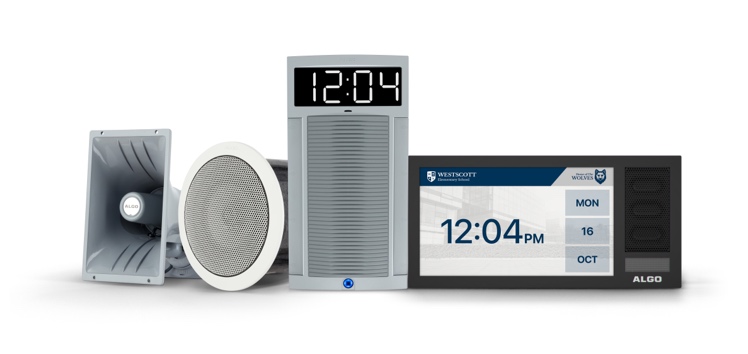
Wideband audio for clear, natural speech
Built-in microphone for ambient noise detection and automatic volume adjustment
SIP compliant, multicast capable, PoE powered
Remote supervision and health monitoring
IP Intercoms
Algo IP intercoms are robust and secure solutions for two-way communication and door entry.
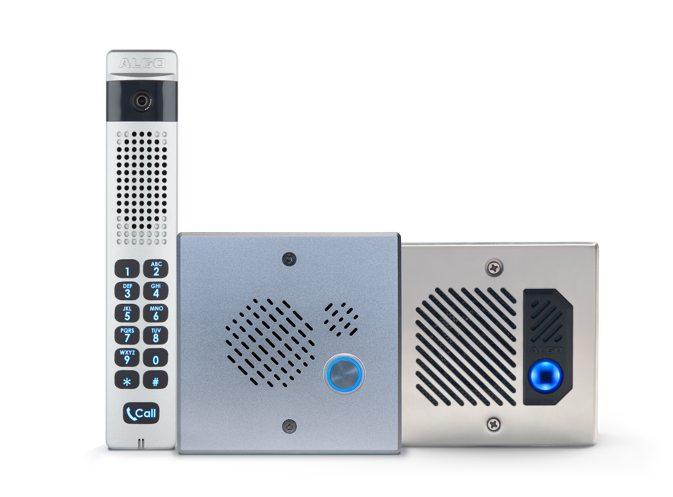
Hands-free communication with optional video capability
SIP-based, integrates with access control systems
Indoor, outdoor, and vandal-resistant models available
Programmable call routing and directory support
IP Paging Adapters
Algo paging adapters bridge IP environments to existing analog paging systems.
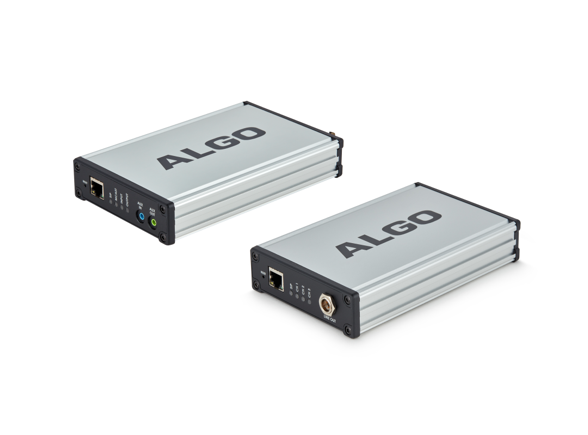
Enable SIP paging, bells, and tones on legacy PA infrastructure
Zone control and multicast support
Embedded scheduler for automated announcements
Simplify hybrid IP/analog system deployments
IP Displays
Algo IP displays combine visual messaging and synchronized timekeeping.
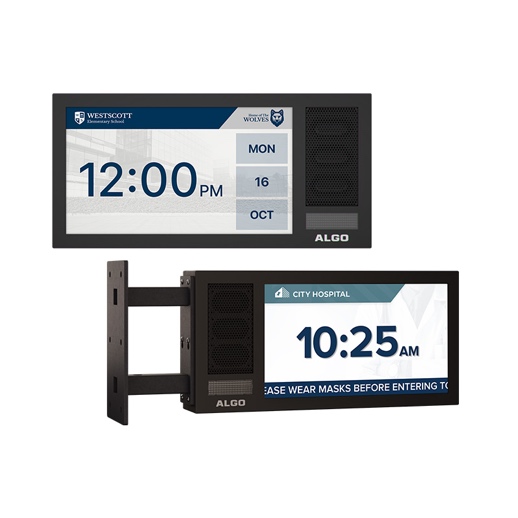
LCD display for time, date, and scrolling alerts
Network-synchronized clocks
Multi-zone message capability
Seamless integration with SIP and multicast paging
IP Visual Alerters
Algo IP strobe lights and visual alerters enhance communication in noisy or sensitive environments.

High-visibility LED strobes with multiple colors
Configurable flash patterns and brightness
Triggered by paging, ring, or emergency events
Ideal for safety, security, and accessibility
IP Console
Algo’s console provides intuitive, real-time control for paging and emergency alerting.
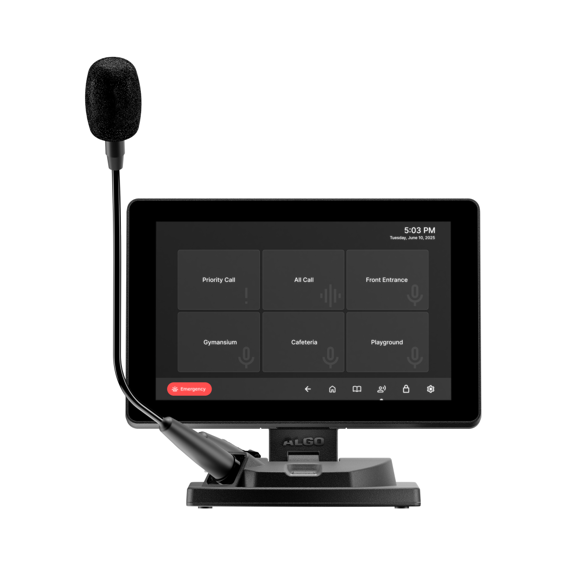
Touchscreen interface with customizable layouts
Gooseneck microphone for live paging
One-touch action button for instant alerts
User-level access with passcodes for security
Management
Algo management tools simplify configuration and monitoring across deployments.
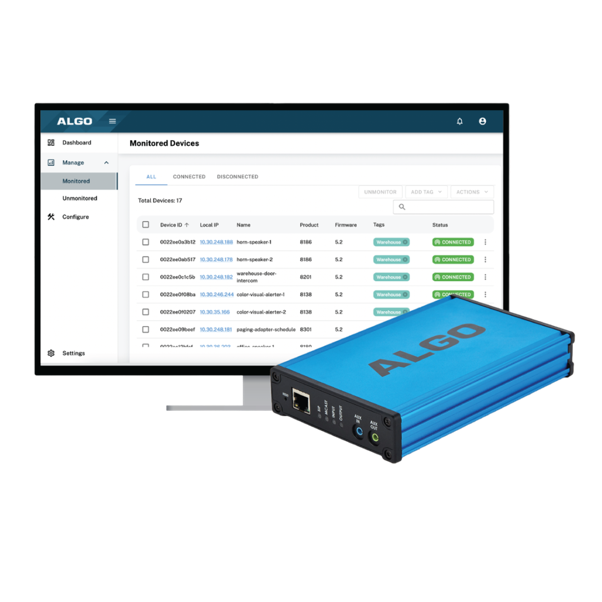
Centralized provisioning and updates
Device supervision with alerts and logs
Scales from small sites to enterprise networks
Redundancy options for reliability
Accessories
Accessories extend the versatility and installation options of Algo devices.

Mounting kits and trim rings for flexible installs
Satellite speaker add-ons for expanded coverage
Power and cabling accessories
Designed to complement and complete Algo solutions
System Architecture
Algo’s IP paging and alerting solutions are built on open standards (SIP, multicast, and APIs) to integrate seamlessly with VoIP, UC platforms, and existing analog systems. The architecture is modular and scalable, allowing organizations to start with a single endpoint and expand into enterprise-wide deployments.
Key Components
IP Endpoints: Speakers, intercoms, displays, visual alerters, and consoles form the communication layer for paging, alerts, and notifications.
Paging Adapters: Bridge legacy amplifiers and analog speakers into the IP environment, enabling hybrid deployments.
Network Integration: Devices register as SIP endpoints or use multicast for scalable distribution of audio and alerts. APIs extend integration into workflow or automation platforms.
Management & Scheduling: Tools like the Algo 8301 Scheduler automate bells, tones, and announcements, while centralized management simplifies provisioning and monitoring.
Typical Configurations
Satellite Speaker System: A single powered IP speaker can drive multiple satellite units over standard cabling, delivering fully supervised coverage at reduced cost.
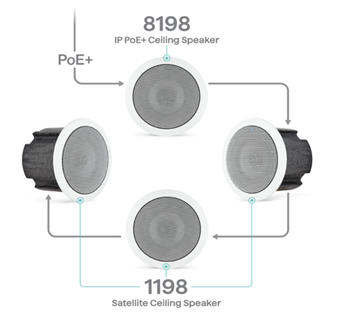
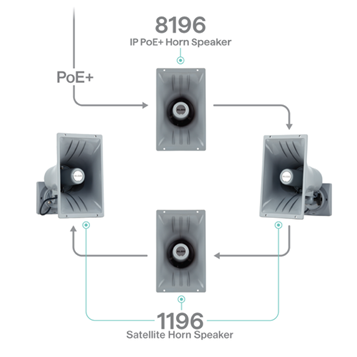
Hybrid Systems: Paging adapters enable IP devices to work alongside existing analog amplifiers and speakers, making it easy to modernize in phases.
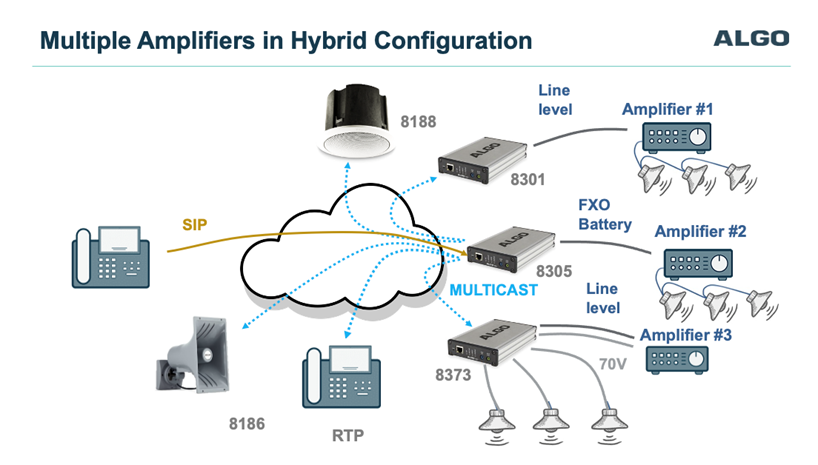
Integrated Solutions: Intercoms, visual alerters, and displays can be combined to provide multi-sensory alerting for critical events, with redundancy built in for reliability.
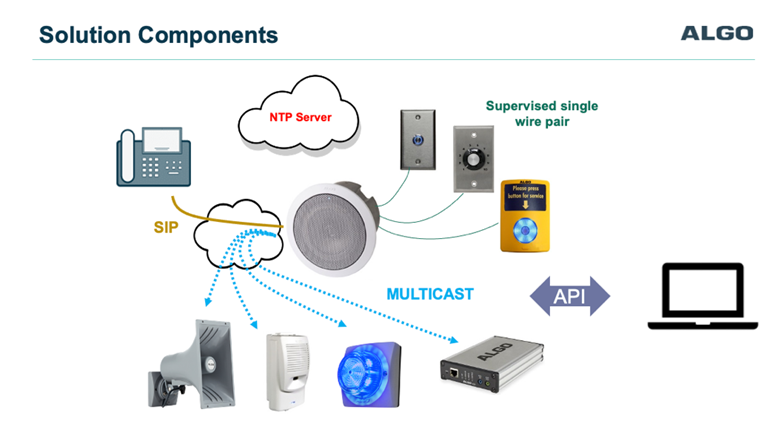
Benefits of the Architecture
Fully supervised endpoints for reliability
Flexible deployment: standalone IP, hybrid IP/analog, or phased upgrades
Scalable to thousands of devices across networks or campuses
Unified paging, notification, and alerting under a single IP-based platform
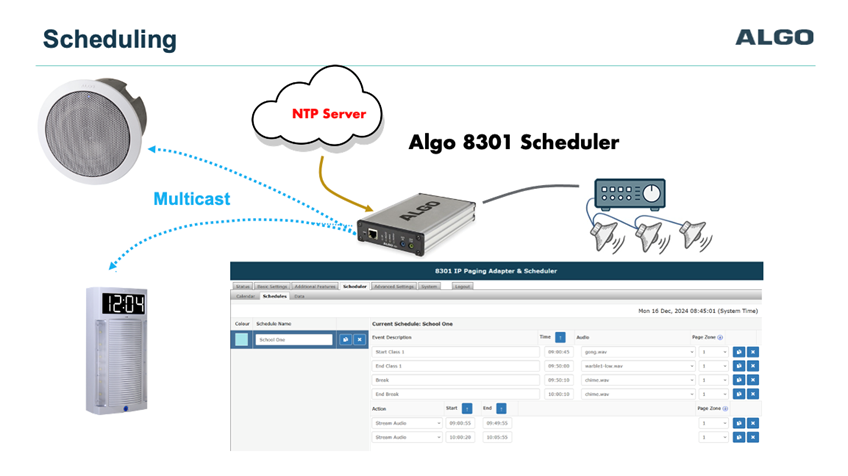
Step-by-Step Setup
In the following sections, you’ll find a detailed, step-by-step configuration guide that walks you through integrating and setting up Algo IP Endpoints with Intermedia Unite, providing clear instructions for a successful deployment.
Note
Algo endpoints register to Intermedia as “AnyPhone BYOP” devices. AnyPhone BYOP allows any SIP-enabled device to be connected and provisioned for use with Intermedia Unite.
Configuration Setup
Access Elevate
Click on Elevate in the main menu, or click on Service, then select Elevate.
 (1).png)
Add a New Device.
Navigate to the Devices menu.
Click +Add Devices.
.png)
In the window that appears, choose Setup your own device.
.png)
Specify Device Details
For the brand, select Other.
Manually enter “Algo” as the brand and enter the model of the device you are registering. Note that this information can be customized to the administrator’s preference.
Leave the User Assignment field blank.
Click Setup Device to continue.
.png)
Create a Resource Account
Go to Resources & Utilities and select Create.
.png)
Choose Resource and select Proceed.
.png)
You can assign more than one device to a single user. This may be useful, for example, for setting up a loud or visual ringer device.
Tip
Resource Accounts are the most efficient for paging, alerting, and common area devices. Full user accounts or other account types can also be used if needed.
Enter Resource Account Information.
Provide a name for the Resource Account.
Select the Location and an Extension (ensure the extension is not already assigned).
Choose a Phone Number from the available pool.
Select a Plan.
“Resource Line (pay per use)” is generally recommended.
For information on usage and overage charges, consult Intermedia’s knowledge base.
Click Create resource.
.png)
If prompted, accept the total charges and confirm to proceed.
Assign the Device to the Resource Account
Open the newly created Resource Account.
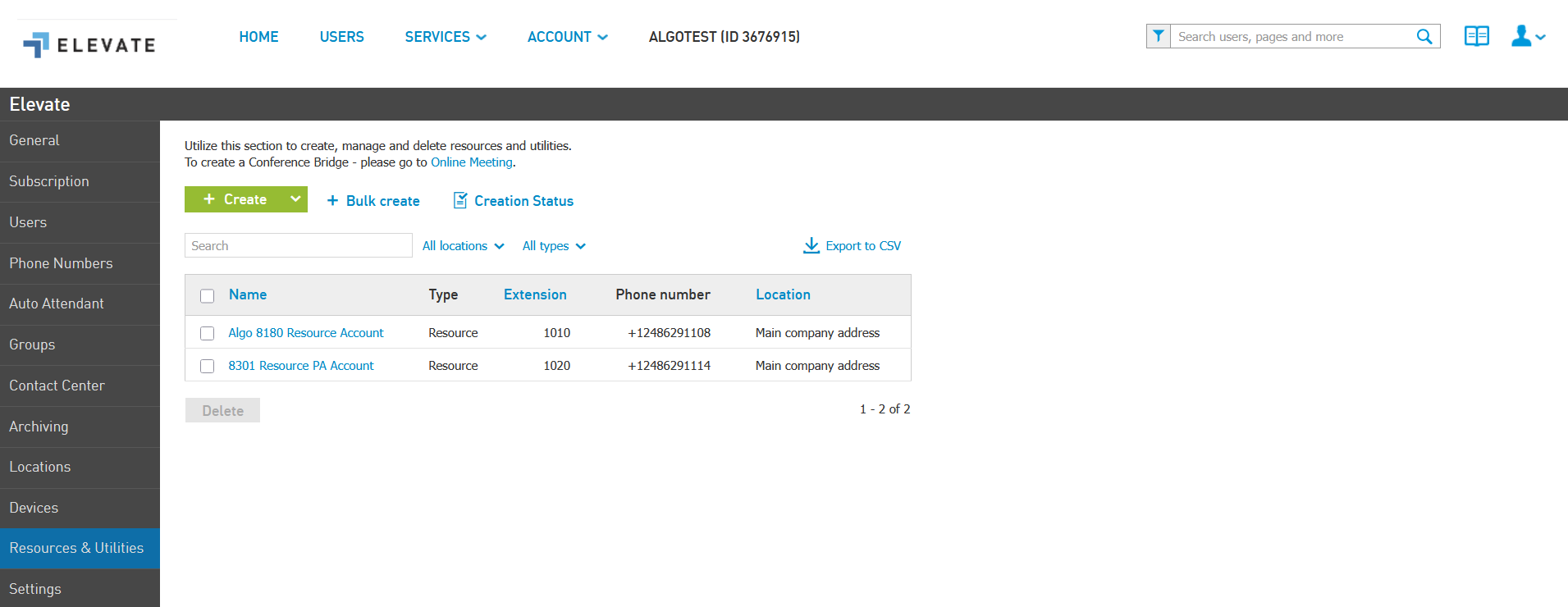
In the account, go to the Devices menu.
Click + Assign New.
.png)
Select your device from the list and click Assign device.
.png)
Retrieve SIP Credentials
After assigning the device, click on the device entry. This brings you to the device view (alternatively, access it via the Devices menu).
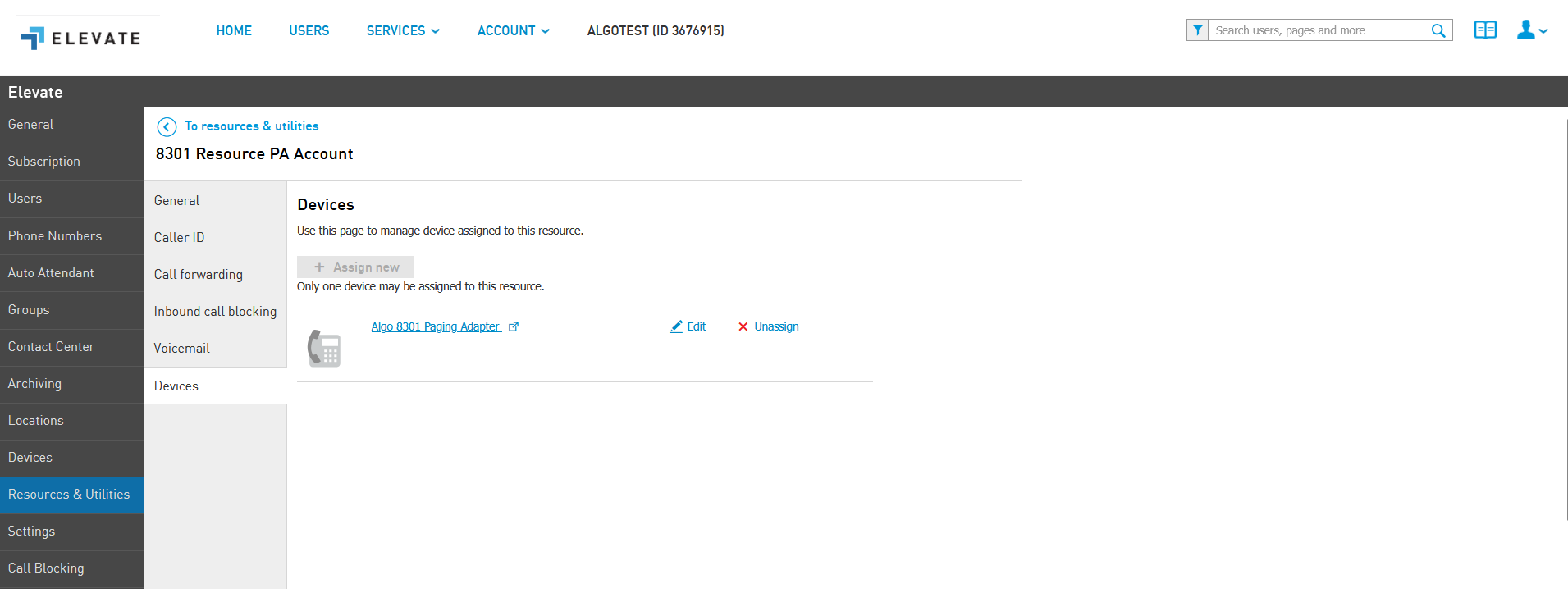
Within the device details, select Get Credentials.
.png)
The system will generate the SIP credentials needed, which you will enter into the Algo endpoint for registration.
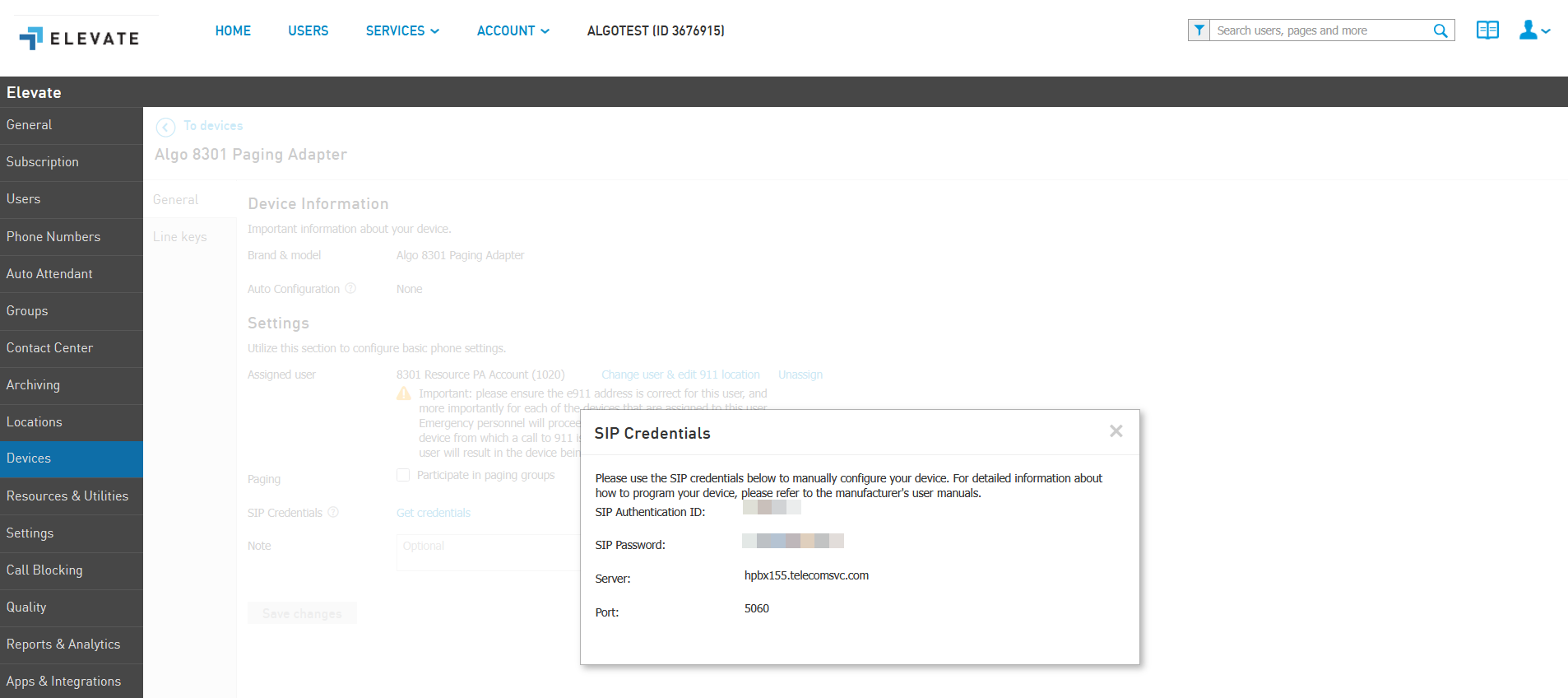
Configure SIP Settings on the Algo Device
Open the web interface for your Algo IP endpoint.
Navigate to Basic Settings → SIP.
In the SIP configuration fields, enter the SIP credentials obtained in the previous step. Fill out the following fields:
Algo IP Endpoint Web Interface Fields | Intermedia Fields |
SIP Domain (Proxy Server) | Server + Port |
Page Extension | SIP Authentication ID |
Authentication ID | SIP Authentication ID |
Authentication Password | SIP Password |
Note
The default SIP port for all Algo devices is 5060, which is automatically assumed and does not need to be specified. To use a different port, enter it in the format: proxyaddress:port (e.g., sip.example.com:5061).
Note
While this guide focuses on registering a page extension using SIP credentials, Algo devices are versatile and support a variety of extension types for different applications. The same SIP credentials can be used to register additional extension types, such as alert, intercom, or ring extensions, or even multiple extensions of the same type (e.g., several page extensions). This allows for flexible deployment tailored to specific communication needs.
.png)
Verify SIP Registration Status
In the web interface for your Algo device, navigate to the Status → Device tab.
Check the SIP Registration field to confirm that the device is successfully registered.
.png)
Alternatively, you can verify the registration status from the Elevate control panel by going to Quality → Current Device Status.
Use this view to ensure the SIP device shows as registered and active within the Elevate system.
.png)
ADDITIONAL INFORMATION & RESOURCES
Hunt Groups and Page Groups
In some environments, you may encounter or need to configure features called hunt groups or page groups when deploying Algo devices. Recognizing their differences can help you determine whether to use them for your application.
Hunt Groups
Let you direct incoming calls to several extensions or users.
The system automatically distributes calls to members based on pre-set rules (e.g., order, simultaneous ringing).
Commonly used for night bell or loud ringing applications. This setup ensures that incoming calls trigger a loud ringer or bell through an Algo device, making it ideal for environments where calls need to be audibly announced to a team or in loud areas after hours.
Page Groups
Allow you to make one-way, real-time audio announcements to a specific group of devices (including Algo endpoints).
Commonly used multi-site paging or paging through Algo device or devices from other manufacturers, which do not support multicast.
Related Links:
TROUBLESHOOTING
If your Algo endpoint fails to register, use the following steps to diagnose and resolve common issues:
1. Confirm Registration Status
Check the Status → Device tab in the Algo device web interface for SIP registration status.
Alternatively, verify status in the Elevate control panel under Quality → Current Device Status.
2. Common Causes & Solutions
Incorrect SIP Credentials
Double-check that the SIP server, user ID/extension, authentication ID, and password match what was provided by your service.
Re-enter credentials to eliminate typos.
Confirm the SIP port is set to 5060 or specify it as proxyaddress:port (if using a different port).
Network Connectivity Issues
Ensure the Algo device has internet access and can reach the SIP server.
If using VLANs or firewalls, verify appropriate rules are in place for SIP traffic (default port 5060, unless otherwise configured).
Make sure firewalls or NAT devices are not blocking the required port(s).
Review Intermedia’s Service and Configuration - Port information
Account or Licensing Issues
Confirm sufficient resource accounts, licenses, or plans are assigned, and that total charges (if any) were accepted during setup.
3. Additional Checks
Device Firmware
Ensure your Algo device is running the latest firmware. The latest firmware image is available through Algo’s website.
If the issue persists after these checks, collect error messages or diagnostic logs and contact Intermedia’s or Algo’s technical support with these details for further assistance.